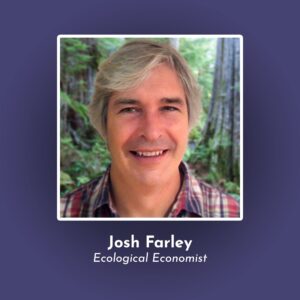
Ep 29 | Josh Farley
Josh Farley: “Money, Money, Money”
On this episode we meet with ecological economist and Professor in Community Development & Applied Economics and Public Administration, Josh Farley.
Money. What is it? Where does it come from? How is it created? How is it tethered to our biophysical balance sheet? What is on the horizon with our monetary system? How might we create and use money differently in the future during a source and sink contained system? Josh Farley explains it all – and explains how the links between money, energy, and the economy will become more central in our lives.
Click here to listen to Josh and Nate’s first conversation on cooperation/competition.
About Josh Farley
Josh Farley is an ecological economist and Professor in Community Development & Applied Economics and Public Administration at the University of Vermont. He is the President of the International Society for Ecological Economics.
In French, we have a motto that says that a simple drawing is often better than a long explanation. Jean-Marc Jancovici Carbone 4 President
That’s very understandable because with left atmosphere thinking, one of the problems is that you see everything as a series of problems that must have solutions. Iain McGilchrist Neuroscientist and Philosopher
We can’t have hundreds and hundreds of real relationships that are healthy because that requires time and effort and full attention and awareness of being in real relationship and conversation with the other human. Nate Hagens Director of ISEOF
This is the crux of the whole problem. Individual parts of nature are more valuable than the biocomplexity of nature. Thomas Crowther Founder Restor
Show Notes & Links to Learn More
Download transcript00:30 – Josh Farley works, info, previous podcast
04:03 – Money Creation in the Modern Economy (Bank of England papers)
05:07 – Mainstream economic theory of money
05:20 – The myth of the barter economy
05:34 – Adam Smith explaining money as a means of barter
05:51 – A reciprocity economy
07:05 – Money evolved to track reciprocal exchange – negating the need for relationships & trust
08:03 – Dunbar’s number
09:23 – The Bank of England report, Richard Werner
09:42 – How the government creates money (Federal Reserve/Central Bank Notes)
10:28 – Fractional reserve banking vs how it actually works
12:33 – There is no interest created when loans are made
14:21 – Exponential growth cannot be matched by a finite planet
14:55 – Loaning money to buy existing assets (stocks)
15:18 – Only IPOs are investments actually investing into capital for productive things
15:55 – In the last 10 years, stock buybacks by existing companies exceeded new stocks 10:1
17:48 – Creating new money is a claim on future resources
21:18 – Land speculation
21:49 – Thorstein Veblen – Business vs industry
22:13 – Finance accounts for 8% of global GDP, quadrupled in the past few decades
22:23 – Paul Volcker comments on FIRE sector
24:12 – How long has inflation been a standard yearly thing
24:46 – Interest rates have been a thing for thousands of years
25:02 – Many societies had jubilees
25:41 – Deflation was a concern for about 20 years
26:04 – Oil price skyrocket in the recession
28:04 – Conventional economics believes technology will always solve scarcity
30:45 – Modern Monetary Theory
31:15 – We do not have unused ecological capacity
32:22 – How ‘printing’ more money affects currency internationally
34:28 – We are doubling debt every 8-8.5 years and doubling economy every 20-25 years
35:00 – How the Great Depression and the Great Recession happened
36:40 – Debt deflation
37:21 – We have a cyclical boom/bust system
38:38 – Leverage ratio of US Central Bank and European Central Bank
42:45 – Quantitative easing
43:35 – Constitution on creating money
44:52 – 85% of politicians in England do not understand that banks create money
45:19 – US debt is 360% of GDP
47:38 – Household debt is 80% of GDP
47:48 – Wages for the poor are rising at record rates
49:06 – Many corporations are jacking up prices using market power and making record profit
50:19 – Brazil’s hyperinflation
53:19 – EROI
54:18 – Good Inflation
58:53 – We feel physical and social pain in the same part of our brain
59:55 – NYT article: businesses investing in green tech can’t be competitive with crypto
1:00:58 – North Dakota State Bank, and other states thinking of creating public banks
1:02:20 – Brazil’s Atlantic Forest cover is at 20%, it needs to get up to 30%
1:02:45 – Creating new parallel currencies
1:04:42 – Bernard Lietaer
1:05:13 – Jobs Guarantee
1:07:22 – Detethering from the gold standard
1:07:58 – Early theories that goldsmiths acted as early banks
1:08:37 – Fiat currencies only last 30-40 years
1:09:30 – The Real is the strongest currency in Latin America
1:09:45 – Inflation Backed Bond
1:10:29 – Public Banking
1:15:59 – Social Media commons
1:19:15 – The most satisfying things you can do are solving problems as a group







